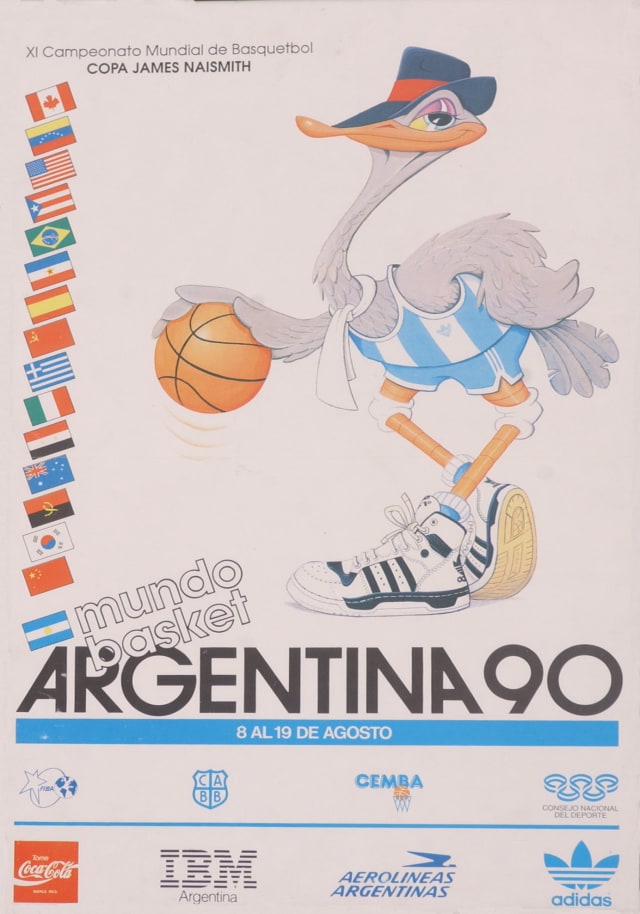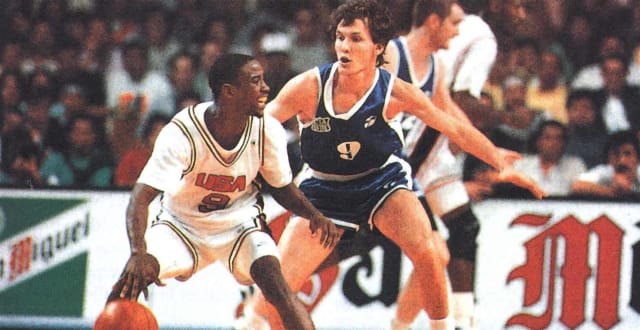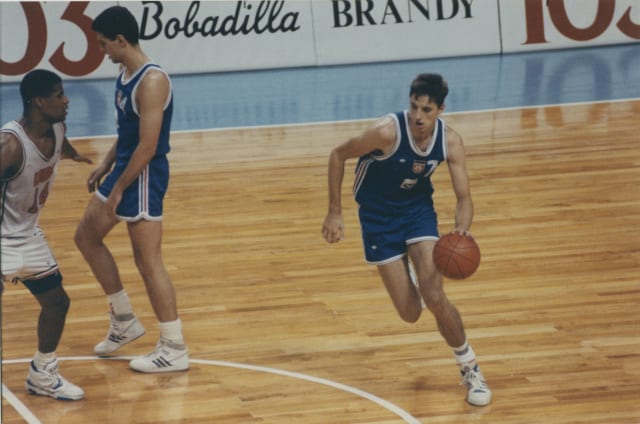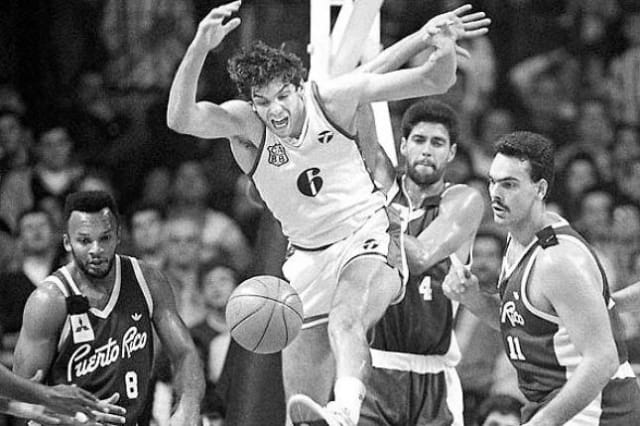The Best of 1990 World Cup: Kukoc, Petrovic, Divac lead Yugoslavia to third title, Oscar Schmidt puts on show
The FIBA Basketball World Cup was back in Argentina in 1990 and Europe reclaimed the title as Yugoslavia won their third trophy. Soviet Union was second and USA took third place.
MIES (Switzerland) - The FIBA Basketball World Cup came back in Argentina in 1990 - forty years after the first edition of the flagship - and Europe ended up reclaiming the title as Yugoslavia won their third trophy. Soviet Union took second place and reigning champs USA finished third in a tournament full of great performances.
Yugoslavia beat Soviet Union 92-75 in the Final - the last World Cup for both entities. It was also the first World Cup in which non-American current NBA players could participate.
The Brazilian legend Oscar Schmidt put on a scoring clinic while Coach Mike Krzyzewski was leading the USA team. Puerto Rico nearly made history in just missing the podium.
The best team: Yugoslavia
| Rank | Team | W-L |
| 1. | Yugoslavia | 7-1 |
| 2. | Soviet Union | 6-2 |
| 3. | USA | 6-2 |
| 4. | Puerto Rico | 6-2 |
| 5. | Brazil | 4-4 |
| 6. | Greece | 4-4 |
| 7. | Australia | 4-4 |
| 8. | Argemtina | 2-6 |
| 9. | Italy | 7-1 |
| 10. | Spain | 5-3 |
| 11. | Venezuela | 4-4 |
| 12. | Canada | 3-5 |
| 13. | Angola | 3-5 |
| 14. | China | 2-6 |
| 15. | Korea | 1-7 |
| 16. | Egypt | 0-8 |
Forty years after the first FIBA Basketball World Cup, basketball's flagship event returned to Argentina in 1990 with Buenos Aires welcoming the globe back. But there were also games in Cordoba, Rosario, Salta, Sante Fe, and Villa Ballester from August 8 to 19.
After expanding the 1986 field to 24 nations, FIBA reduced the participants list to 16 teams for 1990. While hosts Argentina were guaranteed a spot, holders USA had to qualify along with Puerto Rico, Brazil, Venezuela, and Canada from the FIBA AmeriCup. The top five from Europe were Yugoslavia, Greece, Soviet Union, Italy, and Spain with China and Korea as the top two teams from Asia; Angola and Egypt represented Africa to go along with FIBA Oceania Championship winners Australia.

The 16 teams were divided into four groups of four teams with the top two finishers from each group advancing to a second group stage. The two top teams from the second group reached the Semi-Finals and then the tournament finished with the game for third place and the Final.
Puerto Rico, USA, and Soviet Union all went through undefeated along with second-placed finishers Yugoslavia, Greece, and Argentina. There was a three-way tie in Group B at 2-1 and Brazil took first place and Australia were second, leaving Italy to go to Classification 9-16.
Puerto Rico went through the Final Round Group I with three wins while USA finished second after three tight games - a 104-100 win over hosts Argentina as Kenny Anderson scored 32 points; a 79-78 victory against Australia; and then an 81-79 loss to Puerto Rico.
 Kenny Anderson, USA
Kenny Anderson, USA
In Group II, Yugoslavia took top honors with a 3-0 record including a 100-77 win over Soviet Union as Toni Kukoc had 21 points. Yugoslavia would meet USA in the Semi-Finals and Soviet Union met Puerto Rico.
Yugoslavia proved too much for USA as Drazen Petrovic poured in 31 points with 6 three-pointers and Kukoc collected 19 points and 9 assists in a 99-91 victory. Alonzo Mourning scored 28 points for the Americans. The Soviets were unable to rely on Baltic players such as Arvydas Sabonis, Rimas Kurtinaitis or Valdemaras Chomicius but they still were strong enough to beat Puerto Rico 98-82 to reach the Final with Valeri Tikhonenko scoring 23 points and Sergej Bazarevich netting 19 points.
In the game for third place, USA needed a late comeback to force overtime before beating Puerto Rico 107-105 with Anderson scoring 34 points and Mourning hitting 20 points. Jose Ortiz had 25 points in the loss.
The Final was not much of a contest with the Dusan Ivkovic-led Yugoslavia leading 52-34 at halftime and rolling to a 92-75 victory. Zarko Paspalj picked up 20 points, Petrovic had 18 points and Kukoc chipped in 14 points.
The best player: Toni Kukoc, MVP
Toni Kukoc was the second straight player from Yugoslavia to be named World Cup Most Valuable Player following Drazen Petrovic in 1986. While Petrovic led the team in scoring in 1990 at 18.4 points per game, Kukoc was a close second at 16.5 - plus he was such a great ball distributor.
Kukoc started the tournament with 27 points against Venezuela and then scored 12 points versus Angola and was held by Puerto Rico to just 6 points in an early loss to finish the first group stage.

In the second group stage, the sensation from Split, Croatia tallied 20 points in a win over Brazil, collected 21 points in beating Soviet Union and chipped in 13 points in a victory over Greece. Kukoc's passing game was well on display against USA in the Semi-Finals with 9 assists to go with his 19 points and then Kukoc tallied 14 points in Yugoslavia's win over Soviet Union in the Final.
Kukoc was joined on the All-Tournament Team by teammate Vlade Divac, Oscar Schmidt of Brazil, Kenny Anderson of USA, and Fico Lopez of Puerto Rico.
The best game: Puerto Rico v USA - the game for third place
Puerto Rico were hoping to finally win their first-ever medal at the World Cup and were taking on USA, who did not want to leave Argentina empty-handed as they had future legend Mike Krzyzewski patrolling the sidelines for his first World Cup.
Puerto Rico had beaten USA 81-79 in their final game in the first group stage to take first place in the group. And the two countries faced off in the Final of the 1989 Tournament of the Americas - an 88-80 win by Puerto Rico.
In the third-place game, Puerto Rico fell behind 53-48 at halftime but began to take over in the final half of the second half and built a 96-88 lead with just 94 seconds left. Kenny Anderson responded with four points and a Todd Day putback made it 96-94.
Puerto Rico still had the ball with 6.6 seconds left but star Jose Ortiz threw away the in-bounds pass to give USA back the ball. Anderson was fouled with 1.0 seconds to go and made both free throws to force overtime tied 96-96.
Anderson knocked down a big three-pointer in the extra session to make it 103-98 and then Alonzo Mourning's hook shot was ruled a goal-tending with 31 seconds to go and USA had collected third place.
Anderson finished with 34 points and Mourning had 20 points. Ortiz scored 25 points in the loss with Fico Lopez and Jerome Mincy both adding 21 points.
The best story: Puerto Rico comes up just short of making history
Just the fact that Puerto Rico reached the 1990 Semi-Finals and then were just seconds away from a medal is a major testament to one of the country's greatest generations.
Puerto Rico had returned to the World Cup in 1986 after missing the 1982 edition. Angelo Cruz, Edgar de Leon, Francisco de Leon, Fico Lopez, Jerome Mincy and Ramon Rivas all were still on board in 1990 from the 1986 team. Star big man Jose 'Piculin' Ortiz had joined the team at the 1988 Olympics - the country's first Olympics appearance since 1976.
 Jerome Mincy (No. 8), Jose Ortiz (4) and Ramon Rivas (11)
Jerome Mincy (No. 8), Jose Ortiz (4) and Ramon Rivas (11)
In addition, Lopez, Mincy and Francisco de Leon were helped by James Carter and Raymond Gausse in winning the title at the 1989 Tournament of the Americas - the predecessor to the FIBA AmeriCup. Puerto Rico actually beat USA in the Final - an American team that included Billy Owens, Christian Laettner, and Doug Smith from the 1990 World Cup squad as well as future NBA star Gary Payton and long-time NBA players Antonio Davis, Elliot Perry, Lionel Simmons, and Matt Bullard.
The 1990 World Cup was the early stages of a core that would play together for many more years Puerto Rico: Ortiz - three more World Cups and the 1992, 1996, and 2004 Olympics; Lopez - the 1992 Olympics and 1994 World Cup; Mincy - the next two World Cups and 1992 and 1996 Olympics; Carter - 1992 Olympics and next two World Cups; and Edgar de Leon - the next two World Cups.
The best performance: Oscar Schmidt
Coming into the 1990 World Cup, Oscar Schmidt had already played at three World Cups and three Olympics. At the 1986 World Cup, Schmidt scored 28.1 points per game but he finished second in the tournament to Nikos Galis' 33.7 points average. The Brazilian legend averaged an astounding 42.2 points per game at the 1988 Olympics and he was out to win the scoring title in Argentina - despite being 32 years old.
Schmidt started the 1990 World Cup with 25 points against Italy and followed that with 35 points in a win over China but was held to 18 points in fouling out in a tight loss to Australia.
Brazil still ended up winning the first-round group and in the second group stage, Schmidt stepped up his game with 34 and 35 points in losses to Yugoslavia and Greece and again 34 points in a defeat against Soviet Union. Brazil faced Australia again in the Classification 5-8 and Schmidt went off this time for 52 points and then dropped 44 points on Greece to give Brazil fifth place in the tournament. Schmidt ended with 34.6 points per game.
Stats leaders
Scorers
| Player (country) | Points Per Game |
| Oscar Schmidt (Brazil) | 34.6 |
| Antonello Riva (Italy) | 30.3 |
| Panagiotis Giannakis (Greece) | 26.0 |
| Andrew Gaze (Australia) | 24.3 |
| Jordi Villacampa (Spain) | 23.0 |
| Kim Hyun-Jun (Korea) | 22.1 |
| Gabriel Estaba (Venezuela) | 21.5 |
| Wang Fei (China) | 19.4 |
| Kenny Anderson (USA) | 18.8 |
| Valeri Tikhonenko (Soviet Union) | 18.5 |
FIBA